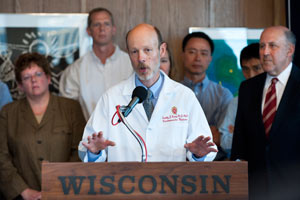Court puts stem cell researchers back to work, for now
A panel of appellate judges removed barriers to embryonic stem cell research funded by federal grants in a decision Thursday, Sept. 9 reversing a suspension of funding ordered in August by another federal judge.

Tim Kamp, professor of medicine and physiology in the School of Medicine and Public Health, and director of the Stem Cell and Regenerative Medicine Center, speaks about the impact of a recent court-ordered block of federal funding for stem-cell research during a press conference at the Waisman Center on Sept. 7, 2010. In the background is UW–Madison Chancellor Biddy Martin, left, a number of university researchers and officials, and Governor Jim Doyle, right.
Photo: Jeff Miller
“We’re excited,” said Tim Kamp, professor of medicine and director of the university’s Stem Cell and Regenerative Medicine Center. “This is great news that the research has been freed up to move forward.”
The U.S. Circuit Court of Appeals for the District of Columbia may have turned the status quo back to researchers’ favor, but a temporary go-ahead that ends a temporary prohibition is hollow relief.
“This still raises great concerns to stability,” Kamp said. “The on-again-off-again situation will only stall the progress of everyone’s work, and we’re hoping for a more lasting legislative solution.”
Earlier this week, Kamp — who in 2009 grew working heart muscle cells from stem cells — joined Gov. Jim Doyle, Chancellor Biddy Martin and a number of UW–Madison stem cell scientists at a news conference to describe the damage done to research by the legal whiplash of shifting stem cell policy.
Even temporary suspensions of federal funding for embryonic stem cell research could mean far-reaching effects for the state of Wisconsin and millions suffering from crippling health problems around the world, according to Kamp.
“It penalizes the researchers, but I don’t think they are the most important ones,” said Kamp. “It penalizes taxpayers, who have invested so much in this research. And it penalizes patients who have been waiting so long for a treatment.”
The legal fits and starts bother Doyle, who would prefer to see scientists focused on their research.
“This is an issue that at some point you think it’s over with, and the scientists can go to work full steam to do the research that will help millions and millions of people around the world,” Doyle said.
In August, a U.S. District Court judge ordered a suspension of federal funding for research using embryonic stem cells, prompting Doyle on Sept. 7 to offer the state’s help on any legal front in lifting the suspension and changing the amendment to federal law the judge used as basis for his decision.
“I don’t think the judge appreciated what the status quo was. This injunction doesn’t preserve the status quo, it creates a new status quo,” Doyle said. “What we have to offer in this legal discussion is to show what actually happens at the University of Wisconsin–Madison and the Medical College of Wisconsin when an injunction like this is enacted.”
At UW–Madison, 22 researchers with labs employing more than 100 people and teaching more than 50 graduate students may have to put down work driven by $7.3 million in funding during 2010 (and another $2 million already spent in the 2011 fiscal year).
“We must be sure the strong tradition of academic freedom, of scientific inquiry coupled with ethical choices, is allowed to continue,” said Martin, who listed the pioneering work of UW–Madison stem cell scientists such as James Thomson as a particular point of pride for the university. “We’re most proud of the hope stem cell research gives to those millions suffering from diseases that had gone without the hope of a treatment.”
Despite what Doyle called Wisconsin’s central and pivotal position in stem cell research, a lasting drought in federal funding could pinch the state harder than research centers on the east or west coasts.
“We lack the private funding sources they have in other parts of the country,” said Stephen A. Duncan, director of the Program in Regenerative Medicine and Stem Cell Biology at the Medical College of Wisconsin. “It makes it hard for me to justify staying in a part of the country that has less private funding for research.”
Even a short-term halt in federal support gives other countries with aggressive stem cell programs a shot at poaching some of Wisconsin’s brightest minds.
“It isn’t whether they’re going to Stanford or MIT or Wisconsin if this injunction is allowed to stand,” Doyle said. “You’re talking about jobs for researchers, from the companies spun off, but also about the postdocs who could be leaving for the UK or Israel.”
Work on treatment for Down syndrome, amytrophic lateral sclerosis, type 1 diabetes, heart disease and other stem cell applications in disease diagnosis and drug development and testing could be set back far longer than even a temporary break in funding, according to Kamp.
“All those things, the researchers in this room have contributed to,” Kamp said, surrounded by colleagues from UW–Madison. “The investment of time, energy, of learning how to work with these cells, could all be stopped or even lost.”
What scientists deserve, Doyle said, is to let their findings guide their research. Instead, they come to work thinking about political issues beyond their control.
“That is tremendously destructive to what is going on in these labs,” Doyle said. “It is critical we let our great researchers take us in the direction science will take us.”
Tags: campus administration, research, stem cells




